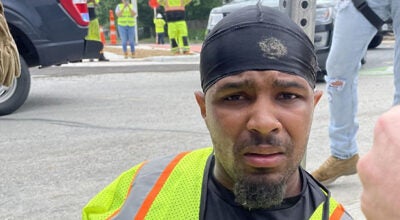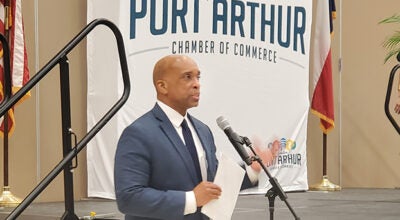Reading, writing, ‘rithmetic and roads discussed at GTDA
Published 5:29 pm Thursday, March 9, 2017
AUSTIN — Two issues many delegates seemed particularly interested in at Monday’s Golden Triangle Days in Austin seminars were on education and transportation.
The first session was on education and workforce development, sponsored by Golden Pass LNG.
Betty Reynard, president of Lamar State College-Port Arthur, and Mark Porterie, superintendent of the Port Arthur Independent School District, were the facilitators.
Speakers were Deshotel and Dr. David Teuscher, with the Texas Higher Education Coordinating Board.
State Rep. Joe Deshotel serves on the education and economic development committees.
“It’s good synergy (serving on those committees),” he said. “I’m so glad industries are here because they play a role.”
One program Deshotel believes is beneficial so students can take college course and earn credits while enrolled in high school.
Deshotel said there are five different avenues a student may choose from if they want to go the college route or the vocational education route.
“College, however, is ready for them if they so choose,” regardless of the route chosen, he said.
He concluded by saying House Bill 5 has played a major role in education.
That bill is related to public school accountability, including assessment, and curriculum requirements; providing a criminal penalty.
Teuscher said THECB’s 60x30TX program is projecting what the state will be like by 2030. The program is structured in 15-year building blocks.
For the years 2007-2016, 11.6 million new jobs were created in the U.S. Of that number 11.5 million needed some element of higher education to do those jobs. During the Great Recession, 60,000 workers who were laid off got their jobs back after the economy improved provided they had a post secondary education.
“Public education is the pathway out of poverty. It is open to all and accessible,” Teuscher said.
By 2030, 60 percent of the jobs in Texas will require some level of post secondary education to do them.
“Employers are looking for a workforce that is skilled,” he said. “The completion of school is absolutely essential.”
Last year, 6.4 million degrees and certificates were awarded in Texas that is behind pace of the rest of the nation. Teuscher said Texas needs to catch up.
Furthermore, Hispanics have traditionally shunned post secondary education. Male students are also lagging and they need to start focusing on post secondary education by the eighth grade.
Some of the marketable skills employers are looking for can be found outside the classroom.
For instance, listening is a lost art, according to Teuscher. Parents need to get involved in the children’s education again.
Under testing, some students can now test out and advance to the next level.
Teuscher spoke briefly on alleviating college students’ debt.
He believes the Texas Opportunity Grant — a program to provide grant aid to students with financial need that are enrolled in Texas public two-year colleges — needs funding.
The session about transportation, sponsored by Arceneaux, Wilson & Cole, LLC.
Ron Arceneaux was the facilitator.
Speakers were State Sen. Robert Nichols and Marc Williams, deputy director of the Texas Department of Transportation.
Arceneaux said there were six issues related to the area’s transportation needs he wanted to focus on:
- A new interchange for Highways 69 and 73 to reduce accidents
- Better access to the ports
- Support for Interstate 10 construction, particularly in Orange County and Major Drive in Beaumont
- Support rebuilding Highway 87 from Sabine Pass to High Island
- A dune protection system against storm surge
- Create Interstate 14 between Ft. Polk and Ft. Hood and the development of U.S. 287 that would run from Lakeshore Drive in Port Arthur, down Highway 69, on to Canada
Nichols said he served on the Texas Transportation Commission prior to being elected to the senate, so he’s familiar with the issues.
He said TxDOT can’t build the projects if there isn’t any funding. In fact, it’s been a problem the past 20 years.
Some reasons for the lack of funding is the fuel tax ended 25 years ago. The point was moot because revenue from the tax dropped because fuel efficiency in vehicles improved.
Vehicle registration fees were the other source of funding for roads in Texas.
Roadways in Texas need to be replaced every 40 years for maintenance.
In 2003, there was no revenue to maintain the system. The state borrowed $20 billion to fund transportation. They were also spending $1.2 billion every biennium on debt service.
Toll roads then became an option.
In 2013 the Legislature started capturing a portion of oil and gas severance taxes for transportation. In 2014, $1.7 billion was deposited. Oil and gas have gone down a little and the state now deposits $500 million a year now.
TxDOT, consequently, laid out $38 million worth of road projects late last year.
Williams said there are 12,000 employees and 25 TxDOT districts.
Texas has more bridges than any other state. By 2050 that number is expected to double.
Unified Transportation Projects are estimated to increase funding by $4 billion.
UTPs are TxDOT’s 10-year plan to guide transportation project development, according to their website.
The UTP authorizes projects for construction, development and planning activities and includes projects involving highways, aviation, public transportation, and state and coastal waterways.
For Interstate 10, $300 million has been invested to make it a six-lane freeway from Houston to the Louisiana state line.
David Ball: 409-721-2427





